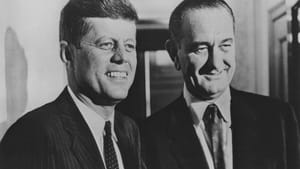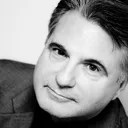Stay in the Loop
BSR publishes on a weekly schedule, with an email newsletter every Wednesday and Thursday morning. There’s no paywall, and subscribing is always free.
The last two great presidents?
Godfrey Hodgson's 'JFK and LBJ'

In the fall of 1960, Philadelphia was the key to victory for Democratic presidential candidate John F. Kennedy. In 1956, Democratic candidate Adlai Stevenson had carried Philadelphia by 110,000 votes, but still lost the state and the presidency. Kennedy would have to do a lot better, so he traveled to Philadelphia in the waning days of the campaign, going to that part of the city where it was vital that he get out the vote — South Philadelphia. I had a front row seat to the candidate’s motorcade, which passed by my house. In those innocent days, there were no fences, no red zones, nothing but a couple of burly guys, presumably with concealed handguns, running behind Kennedy’s open limo. Kennedy was so close I could have hit him with a spitball.
Kennedy won Philadelphia by 330,000 votes, won Pennsylvania, and won the presidency. Although he had less than three years in office, after Franklin Delano Roosevelt, he is the 20th century’s most popular president. Was that popularity deserved? Or should it have gone to his successor, Lyndon Baines Johnson? In JFK & LBJ: The Last Two Great Presidents, English reporter Godfrey Hodgson compares the presidencies and the men. He argues that the media had much to do with Kennedy’s lasting popularity.
For reasons that have little to do with the facts, the media fall in love with one candidate while they treat the other like a cheating spouse with a venereal disease. Those portrayals have electoral impact.
In this century, in 2000, the media loved George W. Bush and portrayed Al Gore as a wooden blowhard. In 2004, it ran every crazy swift boat story it could find about John Kerry. In 2008, it shone such a fierce light on Sarah Palin that she withered before our very eyes. In 2012, it loved Barack Obama and had nothing but scorn for Mitt Romney.
When did it start?
The love-hate relationship that the media has with presidents and presidential candidates goes back decades, according to Hodgson. In 1960, the media fell in love with JFK in spite of some serious liabilities. Any cub reporter could have found out about and reported on JFK’s serious medical problems (Addison’s disease among them), serial womanizing, and blatant use of his father’s enormous wealth to buy votes all over the country. But the media chose to ignore those stories and concentrated on the “Kennedy style.” The camera loved him.
Luckily for JFK, he entered the national spotlight just as TV news was starting to become more important than newspapers. Hodgson points out that it was during JFK’s presidency that the national nightly TV news programs expanded from 15 to 30 minutes. Kennedy was “both the cause and the beneficiary of the development,” Hodgson says. JFK’s weekly news conferences drew large audiences, but style was not enough to handle an increasingly fractious America. Hodgson sums up the tumult of those times in appropriate atomic language:
The bombardment of the nuclei of American civilization by the fast protons of racial, political, industrial, intellectual and sexual rebellion transformed American society with the explosive force of many megatons.
JFK’s challenges
President Kennedy had to respond to never-ending crises: Abroad it was Cuba, Berlin, and Vietnam, and at home it was racial hatred, poverty, and the growing crime rate. The debacle of the failed invasion of Cuba at the Bay of Pigs, the building of a wall in the heart of Berlin, and the assassination of the United States’ handpicked dictator of South Vietnam — with tacit U.S. approval — did not make for a sterling foreign policy record. The one bright spot was the Cuban missile crisis. Domestically, the picture was not much brighter. Hodgson claims that Kennedy was initially tone-deaf to the fight for civil rights. Consistently, he and his brother were outmaneuvered by Southern politicians.
Even so, after JFK’s assassination on November 22, 1963, the media had little sympathy for the very different man who succeeded him. JFK had a wealth of friends in the media and, more importantly, among the historians who were going to write the record of his administration. Hodgson shows the influence they had in one anecdote: Just a week after his death, his widow, Jackie Kennedy, gave an interview to Theodore White (author of The Making of the President series) in which she prompted him to compare her late husband’s tenure in the White House to the legendary Camelot (at that time, Camelot was a hit Broadway musical starring Richard Burton and Julie Andrews). The analogy stuck, and the Kennedy presidency became that halcyon time in America when Kennedy/King Arthur slayed Russian dragon missiles, fought bigoted Knights in white hoods, and stood up for all that was good and noble about America.
The golden age of Camelot glittered in the history books written soon after JFK’s death. But as time went on, the glitter wore off and the cold hard facts made their way to the surface. The post-Watergate media have not been blind to Kennedy’s imperfections, as exemplified by Seymour Hersh’s Dark Side of Camelot.
What about Lyndon?
Hodgson believes that LBJ was never given the credit for what he did to make modern America what it is: the Civil Rights Act of 1964, the Voting Rights Act, the Fair Housing Act, Medicare, and a host of programs aimed at stamping out poverty in America. The Great Society may not have been all that people hoped it to be, but it did a great deal more to eliminate poverty than anything before or since.
Of course, one crucial question is whether JFK would have embroiled us in Vietnam as LBJ did. Hodgson concludes that the evidence is mixed, and the best that anyone can say is Who knows? He quotes McGeorge Bundy, national security advisor to both men, as observing, “Kennedy didn’t want to be dumb. Johnson didn’t want to be a coward.” That suggests that JFK may have not trusted his military advisors as much as LBJ did.
The one piece of legislation that both men pushed for and Johnson got passed was the Immigration and Naturalization Act of 1965, which opened up non-European immigration to the United States. It may end up having a more profound impact on the nation than all of the other Great Society programs put together. The controversy concerning immigration reaches into the current battle to see who will occupy the White House in 2017.
And so does the dynamic described in Hodgson’s book. The power of media to influence public opinion, the idea that one person, however great, can influence the course of events, and the need for the public to look beyond the “style” of a candidate will all come into play in deciding who the next president will be. Regardless of whether you believe that Kennedy or Johnson were great presidents, Hodgson concludes:
[W]hatever the failures and errors of those years, they were arguably the time when the American government did better than before or since to serve the best interests of the American people. That is the true epitaph of JFK and LBJ, the last two great presidents.
What, When, Where
JFK and LBJ: The Last Two Great Presidents by Godfrey Hodgson. Yale University Press, 2015. Available at Amazon.
Sign up for our newsletter
All of the week's new articles, all in one place. Sign up for the free weekly BSR newsletters, and don't miss a conversation.

 Armen Pandola
Armen Pandola